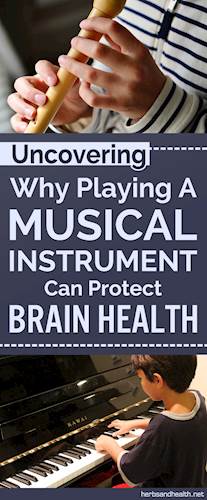

Advances in neuroscience have enabled researchers to study the beneficial effects of music on the brain. However, there is a limited understanding of the deeper reasons why music makes a difference. Now, a group of researchers has published a study that reveals why playing a musical instrument can protect brain health.
Led by Dr. Bernard Ross, a senior scientist at Baycrest Health Science’s Rotman Research Institute, the study first appeared in the Journal of Neuroscience [1] on May 24, 2017. Ross and his team used 32 healthy adults who listened to and played a Tibetan singing bowl. According to the researchers, brain scans showed the role of playing the singing bowl in changing brain activity, which posits the potential of playing a musical instrument as a measure to protect against cognitive decline.
The new research found that learning to play a musical instrument actually changes the brain’s wiring, which can compensate for diseases or injuries that may hamper an individual’s capacity to perform tasks. The study’s findings support another work by Dr. Ross’ on the rehabilitation of stroke survivors’ motor movement in their upper bodies using musical training. [2]
Baycrest is a research-intensive institution that had successes in studying the impact of people’s musical background on their listening and cognitive function [3] as they age. The organization is also focused on investigating the association between brain changes and hearing – and how these are affected by the aging process.
The team is seeking additional funding to conduct further research on musical training rehabilitation programs for medical conditions such as traumatic brain injury. They are planning to examine the impact of musical training on the brains of older adults and to compare the recovery offered by musical training and physiotherapy to stroke patients.
The Baycrest study presents evidence on how playing a musical instrument can spark a symphony of activity all over your brain. It highlights the profound and lasting impact of musical training on the brain. According to Anita Collins, an Australian educator and researcher, listening to music enables multiple areas of your brain to become engaged and active, but playing an actual instrument offers you a full-body brain workout. Collins presented a talk [4] at TED-Ed in 2014 that discussed the long-term positive effects of playing an instrument.
If you want more evidence on how music affects brain health, it makes sense to look at the brains of professional musicians who had been the subjects of many studies. A 2003 study conducted by Harvard neurologist Gottfried Schlaug and a colleague [5] discovered that adult professional musicians had a larger volume of gray matter in their brains than non-musicians. The researchers proposed the importance of musical training in early childhood to structural brain changes associated with motor and auditory improvements.
In 2012, neuropsychologist Brenda Hanna-Pladdy of Emory University published a study that proved the long-term benefit offered by early musical training, [6] regardless of how much other education a person received in life. This implies that the earlier and the more intense the musical training is during childhood, the more an individual’s brain will develop. If you are interested in keeping your mind sharp during the latter years of your life, why not integrate a little music to your life? Your body, brain, and social life will thank you later.
This website is powered by Spruz
Comments